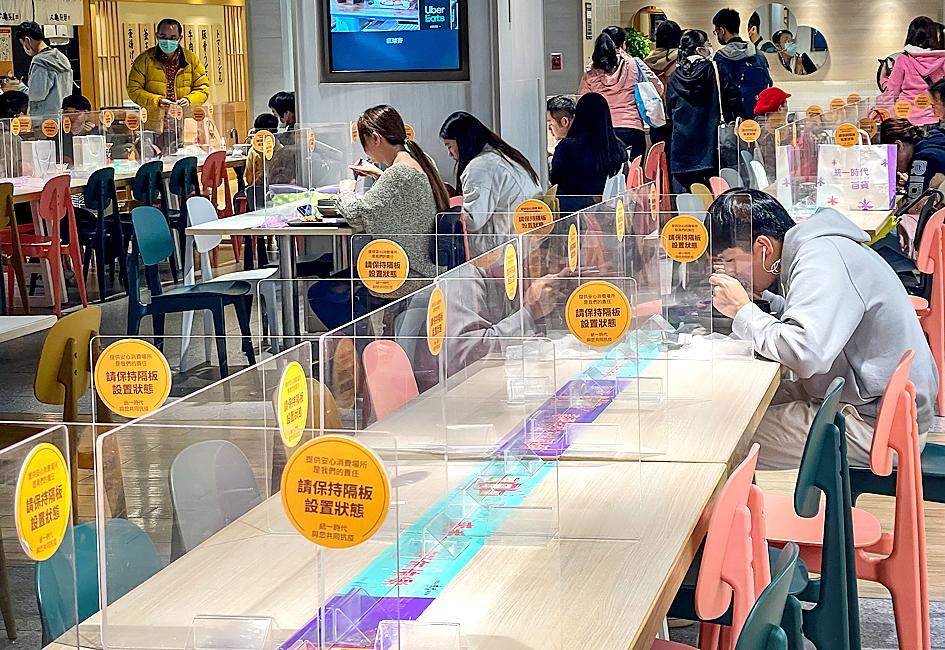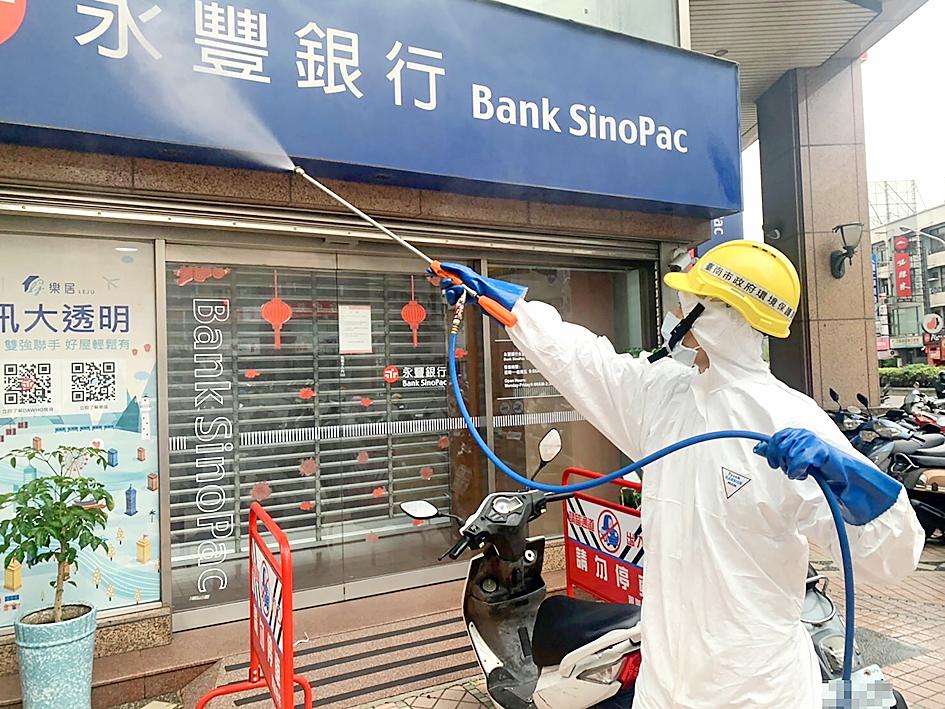Taipei Mayor Ko Wen-je (柯文哲) yesterday announced that the city is raising its COVID-19 alert level to 2.5, with a conditional ban on dine-in services.
People who have received two or three shots against COVID-19 can dine in at eateries, while those who have not been vaccinated or have only received one jab should only eat on-site if there are isolation booths, he told a news conference.
Ko said he is not thinking of raising the alert level to 3, as Taiwan has a relatively high vaccination rate and vaccinated people are less likely to spread the virus.

Photo: CNA
Taipei residents are advised to voluntarily abstain from dining in, which remains a high-risk activity, he said.
During the level 2.5 period, people can dine in if they have received their second dose at least 14 days before, while those who have not should order takeout or delivery, he said.
The measures are advisory for now, as the city hopes that the partial restrictions on indoor dining would encourage people to behave responsibly, he said, adding that more forceful measures might be imposed if compliance is low.

Photo courtesy of the Tainan City Government via CNA
Asked about dining regulations for children aged 12 or younger, Ko said that they can dine in if they are accompanied by a parent.
The Central Epidemic Command Center (CECC) on Monday extended the nation’s level 2 COVID-19 alert to Feb. 7, meaning that people are still required to wear masks outside their homes, unless they are eating, or if they are in outdoor spaces with very few people, such as in forests or fields.
Asked about Ko’s announcement, Minister of Health and Welfare Chen Shih-chung (陳時中), who heads the center, said that so long as the alert level is within the level 2 range, local governments can raise it to a level they see fit, be it level 2.5, 2.6 or 2.4, and that the public must abide by the regulations.
The CECC yesterday reported 71 new COVID-19 infections: 27 domestic and 44 imported cases.
Most of the new locally transmitted cases were linked to known clusters in Taoyuan, Kaohsiung and Yilan County, or isolated cases in a New Taipei City hospital, Chen said.
However, there are three confirmed cases whose sources of infections are still being investigated, including two Taoyuan residents in Bade District (八德), who took the test at COVID-19 testing sites in the city, and an Indian national, who took the test for a trip abroad, Chen said.
Twelve of the 27 local cases are breakthrough infections, while seven are children younger than 10 who are not eligible for vaccination against COVID-19 in Taiwan. Two received one dose each of the Pfizer-BioNTech vaccine, one is unvaccinated and the status of the remaining five has yet to be determined, the CECC said.
The center did not release information on the vaccination status of the imported cases.

A preclearance service to facilitate entry for people traveling to select airports in Japan would be available from Thursday next week to Feb. 25 at Taiwan Taoyuan International Airport, Taoyuan International Airport Corp (TIAC) said on Tuesday. The service was first made available to Taiwanese travelers throughout the winter vacation of 2024 and during the Lunar New Year holiday. In addition to flights to the Japanese cities of Hakodate, Asahikawa, Akita, Sendai, Niigata, Okayama, Takamatsu, Kumamoto and Kagoshima, the service would be available to travelers to Kobe and Oita. The service can be accessed by passengers of 15 flight routes operated by

Chinese spouse and influencer Guan Guan’s (關關) residency permit has been revoked for repeatedly posting pro-China videos that threaten national security, the National Immigration Agency confirmed today. Guan Guan has said many controversial statements in her videos posted to Douyin (抖音), including “the red flag will soon be painted all over Taiwan” and “Taiwan is an inseparable part of China,” and expressing hope for expedited reunification. The agency last year received multiple reports alleging that Guan Guan had advocated for armed reunification. After verifying the reports, the agency last month issued a notice requiring her to appear and explain her actions. Guan

GIVE AND TAKE: Blood demand continues to rise each year, while fewer young donors are available due to the nation’s falling birthrate, a doctor said Blood donors can redeem points earned from donations to obtain limited edition Formosan black bear travel mugs, the Kaohsiung Blood Center said yesterday, as it announced a goal of stocking 20,000 units of blood prior to the Lunar New Year. The last month of the lunar year is National Blood Donation Month, when local centers seek to stockpile blood for use during the Lunar New Year holiday. The blood demand in southern Taiwan — including Tainan and Kaohsiung, as well as Chiayi, Pingtung, Penghu and Taitung counties — is about 2,000 units per day, the center said. The donation campaign aims to boost

The Central Weather Administration (CWA) said a magnitude 4.9 earthquake that struck off the coast of eastern Taiwan yesterday was an independent event and part of a stress-adjustment process. The earthquake occurred at 4:47pm, with its epicenter at sea about 45.4km south of Yilan County Hall at a depth of 5.9km, the CWA said. The quake's intensity, which gauges the actual effects of a temblor, was highest in several townships in Yilan and neighboring Hualien County, where it measured 4 on Taiwan's seven-tier intensity scale, the CWA said. Lin Po-yu (林柏佑), a division chief at the CWA's Seismological Center, told a news conference